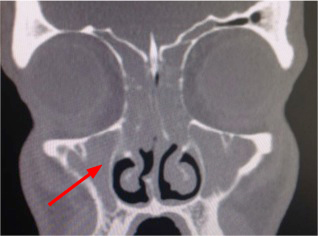Differentials
Other causes of chronic cough
SIGNS / SYMPTOMS
Includes asthma, bronchiectasis, interstitial lung disease, gastro-oesophageal reflux disease, and ACE inhibitor use.
Symptoms vary depending on the condition.
Asthma: dyspnoea, expiratory wheeze, nasal polyposis.
Bronchiectasis: sputum production (may be bloody), hemoptysis, dyspnoea, fever, crackles or rhonchi on lung auscultation.
Interstitial lung disease: fatigue, weight loss, dyspnoea, crackles on lung auscultation.
Gastro-oesophageal reflux disease: heartburn, indigestion, cough with phonation, on eating, on bending over, or on first becoming ambulatory in the morning; may coexist with upper airway cough syndrome (UACS).
INVESTIGATIONS
Asthma: FEV1 <80% of predicted; FEV1/FVC ratio <80% of predicted; peak expiratory flow rate as a comparison with patient's personal best or normal values for height and gender.
Bronchiectasis: chest x-ray may be normal or show obscured hemidiaphragm, thin-walled ring shadows with or without fluid levels, tram lines, or tubular or ovoid opacities.
Interstitial lung disease: chest x-ray shows basilar, peripheral, bilateral, asymmetric, or reticular opacities.
Gastro-oesophageal reflux disease: proton-pump inhibitor trial relieves symptoms; atypical symptoms (e.g., hoarseness) warrant further investigation (e.g., endoscopy may show esophagitis).
Allergic rhinitis
SIGNS / SYMPTOMS
Can coexist with UACS or be an exacerbating factor.
Rhinorrhoea/persistent clear nasal discharge.
Sneezing.
Intermittent nasal blockage.
Nasal pruritus.
Conjunctivitis.
Unilateral nasal symptoms, facial pain, thick green discharge, recurrent nosebleeds, or persistent loss of smell warrant further assessment.[22]
INVESTIGATIONS
Allergen skin-prick testing: wheal and flare reaction after specific allergen is introduced into the skin.
Specific aeroallergen radioallergosorbent test (RAST): positive.
These tests can establish the presence of atopy; however, it can be difficult to be certain that the chronic cough in upper airway cough syndrome is arising from an allergic mechanism.
Non-allergic rhinitis (perennial)
SIGNS / SYMPTOMS
Can coexist with UACS or be an exacerbating factor.
Occupational exposure or exposure to physical irritants.
Profound rhinorrhoea.
Unilateral nasal symptoms, facial pain, thick green discharge, nosebleeds, or loss of smell warrant further assessment.[22]
INVESTIGATIONS
Allergen skin-prick testing: negative.
Non-allergic rhinitis with eosinophilia (NARES)
SIGNS / SYMPTOMS
Can coexist with UACS or be an exacerbating factor.
Nasal pruritus.
Ocular pruritus.
Excessive lacrimation.
INVESTIGATIONS
Nasal eosinophil smear: elevated.
Rhinitis medicamentosa
SIGNS / SYMPTOMS
Can coexist with UACS or be an exacerbating factor.
History of extended use of topical decongestants.
INVESTIGATIONS
No differentiating tests; diagnosis is clinical.
Rhinitis of pregnancy
SIGNS / SYMPTOMS
Can coexist with UACS or be an exacerbating factor.
Pregnant.
INVESTIGATIONS
No differentiating tests; diagnosis is clinical.
Nasal polyps
SIGNS / SYMPTOMS
Can coexist with UACS or be an exacerbating factor.
Chronic rhinosinusitis.
Nasal obstruction.
Facial pain/pressure.
INVESTIGATIONS
Anterior rhinoscopy or nasal endoscopy: polyps visualised.
Sinusitis
SIGNS / SYMPTOMS
Can coexist with UACS or be an exacerbating factor.
Facial pain/pressure.
Nasal obstruction.
Headache.
May be clinically silent.
INVESTIGATIONS
CT sinus: opacification of involved sinuses, mucosal thickening, air-fluid levels, or anatomical abnormalities.[Figure caption and citation for the preceding image starts]: CT sinus demonstrating opacification.Image courtesy of Mr Hesham Saleh; used with permission [Citation ends].
Use of this content is subject to our disclaimer